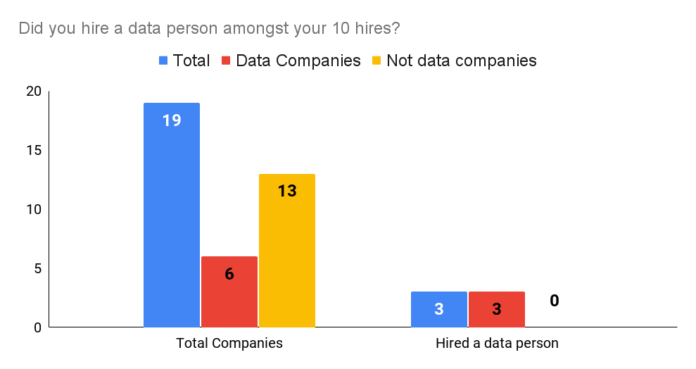And should they?
I recently read an article that talked about the first 10 hires in various startups. To my surprise, none where data people. More interestingly, of the 19 companies interviewed, >30% were data companies, and yet, even amongst data companies, only 50% of those companies recruited a data person:
Additionally, it was just that. 1 data person.
1. Are you validating your RAT?
The lean startup methodology teaches us that building a startup is all about knowing your customer and critically their problems. Validating the RAT (riskiest assumption test) through constant tests that quickly tell us if we really are building the right thing.
To me, data people are critical in this arena. Knowing how to use data to evaluate if we should move on from a project or double down is essential. Knowing how to translate a business problem into metrics, and thus the correct data logging so that you can actually evaluate the performance of your product is critical.
It’s probably no surprise that looking at that data, 100% of those startups hired engineers. And not just 1 engineer, looking at that same data the average number of engineers was 5. So 50% of the first 10 hires, is the engineering team. Engineers are often the most expensive part of a team, and their main mandate is to build products, so are we still following lean product methodology here if we are hiring the builders? Or have all these companies reached product market fit and therefore they need a big engineering team to build their product?
2. Are you wasting time setting this up later?
The data suggests companies start to hire a data team when they hit Series A-B.
But, by this point in time, the company is much larger, and therefore its data problems. are also much larger! The average series A company is 74 people.
You have lots of data everywhere, your metrics don’t match, you have 100’s of questions and you effectively have to hire a data team to spend at least 1 year untangling the mess that is your data. That’s 1 year of time lost to building out infrastructure instead of using the data to get insights. Is that really worth not hiring a data analyst earlier?
From my own experience, I have seen common problems not hiring a data team can have.
- Event logging, companies will have multiple different tools to track events, or, just won’t be doing data logging because needing to build fast has prevented the ability to add logging. I don’t agree with this statement, but have heard this a lot.
- Misinterpretation of results, can lead product in the wrong direction. Let’s take A/B tests. Concepts around sample size and power are often overlooked in startups. Often, you might see positive results in the first couple of days of a test because of the type of visitor, these positive results might encourage a PM to call a test and encourage building a product in the wrong direction, whereas waiting for the power of the test, and a representative sample size, might have led to completely different results. This has happened multiple times in my career where the results of test changed over the course of days.
- But of course, that’s really just the beginning. When you hire a data leader, you need to hire 1 that gets the business, whilst also sympathizing with the needs of your data team (these goals are not always aligned). Data leaders like these are very hard to find.
What is really perplexing about this situation is that on the 1 hand, everyone can agree that data is the “new oil”. Companies celebrate their “data driven decision-making” and yet, given many of these companies don’t have data teams, are they really making data driven decisions? Perhaps you could argue that 1 doesn’t need a data team to use data.
Maybe the rise of the modern data stack is a reflection of startups investment, or lack thereof into data teams. Ultimately, these tools allow data teams in companies to remain small, whilst the technology can help fill gaps companies are not willing to hire for. Perhaps that is a positive thing. The need to hire has been replaced with automation, and it means that when a company does finally hire a data person they can focus on delivering value through insights rather than endlessly cleaning data.
What do you think?






